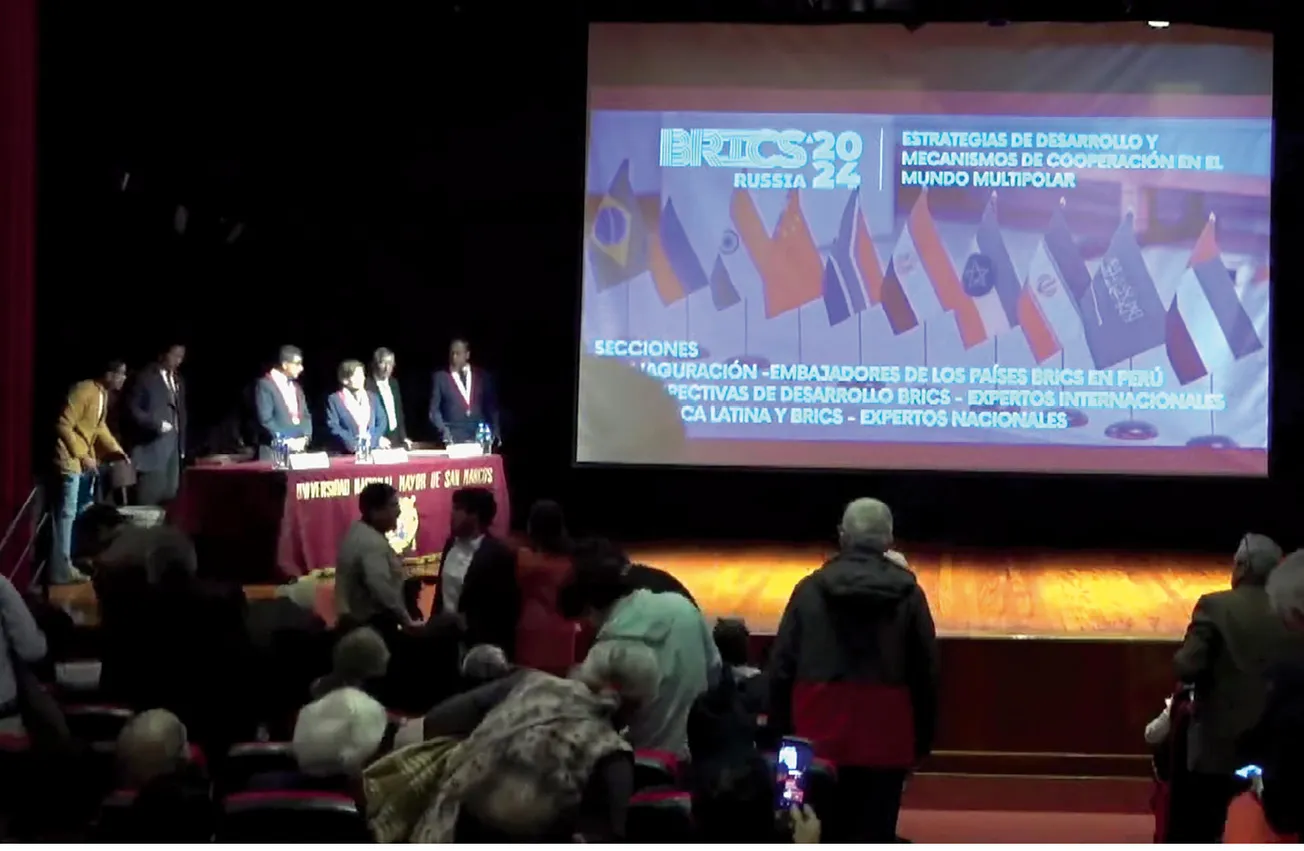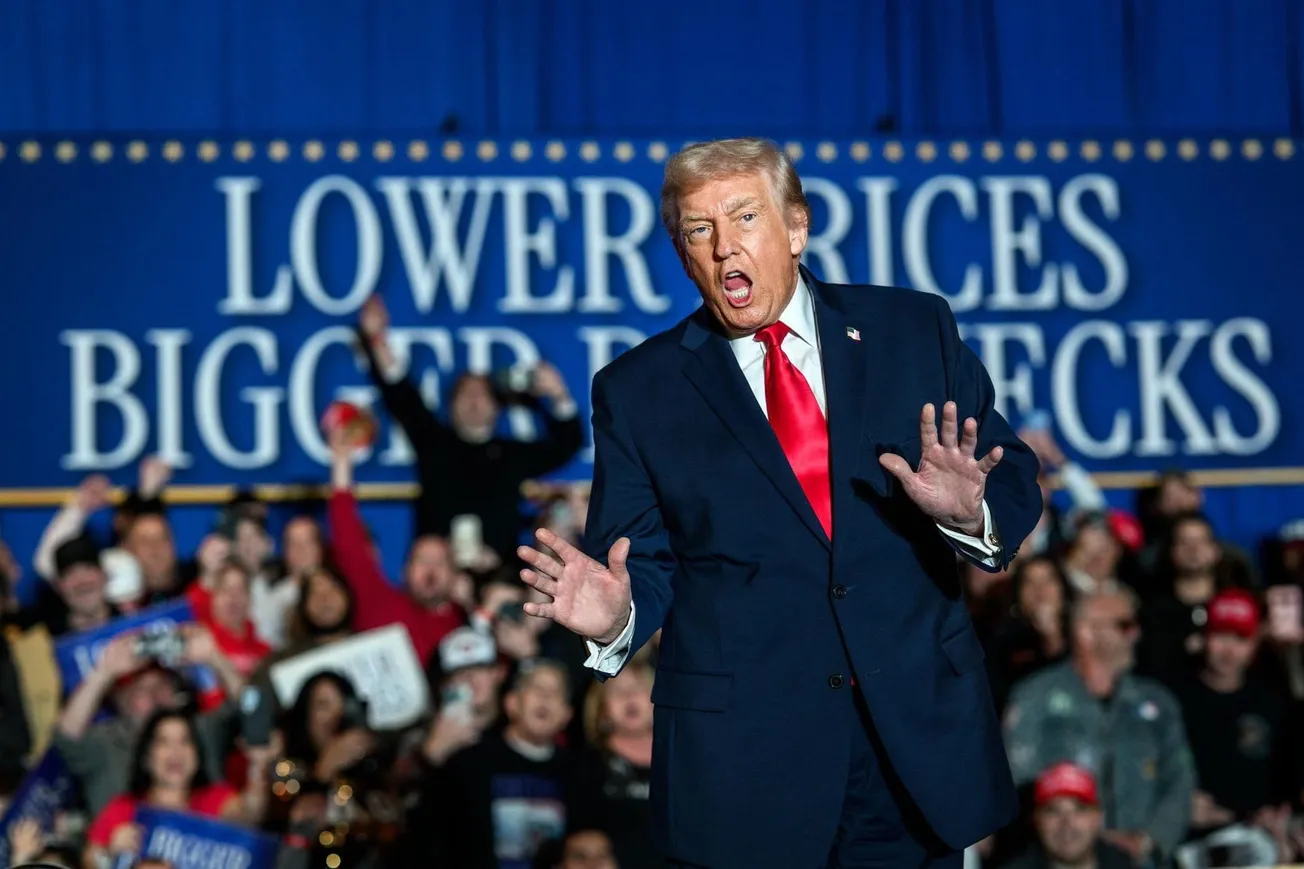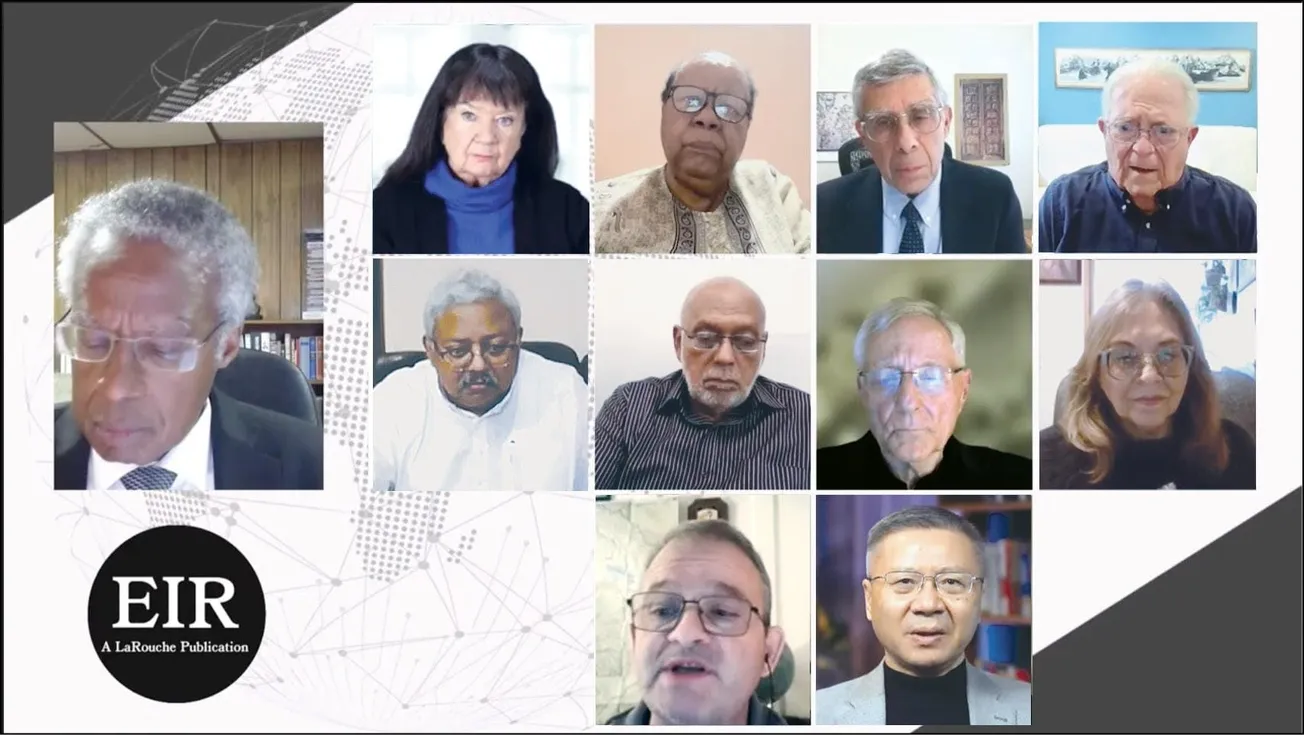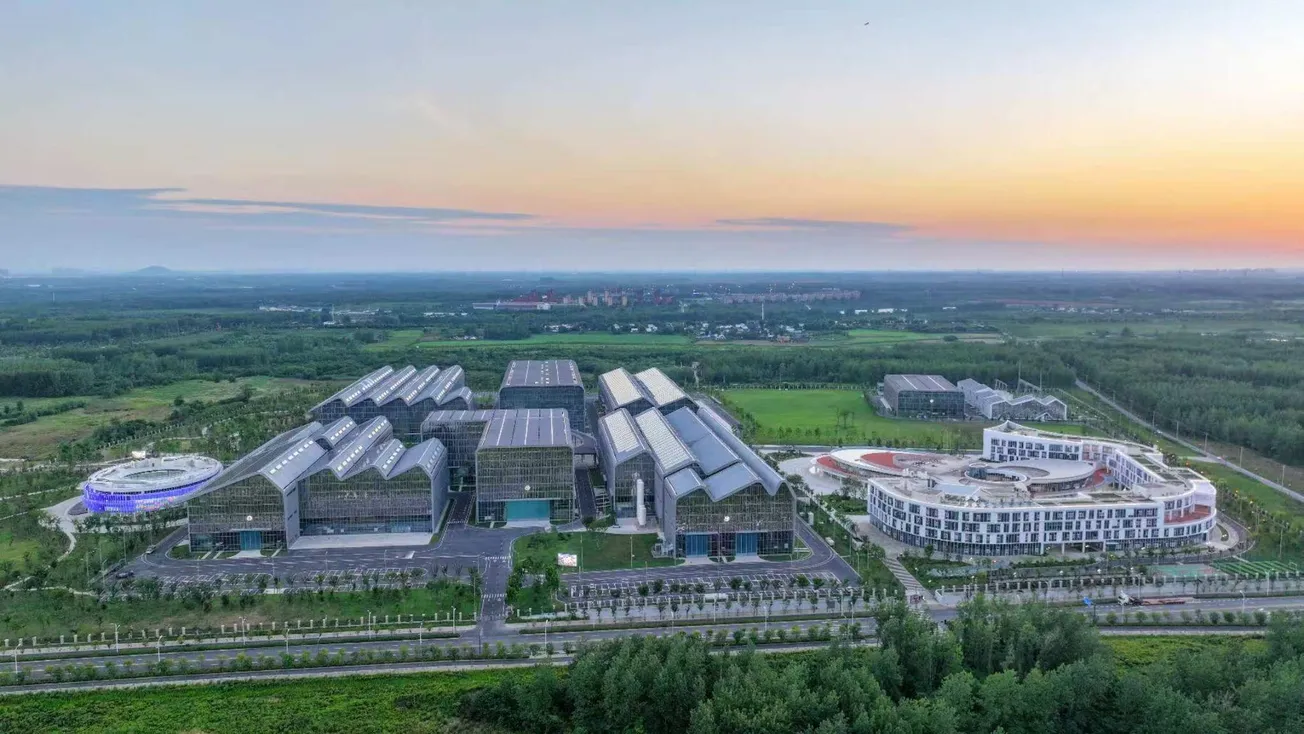Oct. 3—The optimism was almost palpable in the audience of over 500 students, professors, diplomats, and others who gathered in the auditorium of the Central Library of San Marcos University in Lima, Peru, to discuss the role of the BRICS in “Development Strategies and Mechanisms for Cooperation in the Multipolar World.” The event, one of the nearly 200 official BRICS events organized internationally under Russia’s rotating presidency of the BRICS in 2024, was sponsored by the Russian embassy in Peru, San Marcos University, and the Schiller Institute–Peru. It was addressed in person by the ambassadors in Peru of BRICS nations Russia, Brazil, China, Egypt, and India, and remotely by South Africa’s ambassador in Chile. And it featured remarks by the President of San Marcos University (the oldest university of the Americas, founded in 1551), Jeri Ruffner; Russia’s BRICS sous-sherpa, Pavel Knyazev; Viktoria Panova, the head of the BRICS Russian Expert Council; Helga Zepp-LaRouche, the founder of the Schiller Institute; and many other international experts from India, Egypt, Brazil, Italy, and Peru.
The event was a statement: The BRICS, which is growing in numbers of members, represents the aspirations of the Global Majority. The disorder, instability, poverty, and war in the world today must be ended, and replaced with new institutions that meet the needs of our people. We represent different cultures and civilizations—but that is not a weakness; it is our strength. We are optimistic about the potential to change the world!
This was the underlying message of nearly every speech delivered at the Lima event.
“The BRICS has really become the core of the changing world order,” Dr. Panova stated. “We are doing things nobody expected us to do.” She directly addressed the hundreds of students present in the Lima auditorium, and those listening online in Spanish and in English simultaneous interpretation: “I’m speaking to you now from our ongoing BRICS International School that has been happening since 2017. In fact, I hope that your students, your youth, will be participating in the next ones. This school now encompasses not just BRICS members, but 36 countries altogether…. There is certainly a group of countries that is very much supportive of a fair international system, and that could work together” to make that goal a reality.
China’s Ambassador to Peru, H.E. Song Yang, also suggested there was room in the BRICS for Peru and many other countries, noting with a smile that the BRICS does not yet have a Spanish-speaking member. He emphasized that, in a world of growing disorder and conflict, the BRICS is playing a stabilizing and positive role. And he said that the needed changes include a reform of the international financial architecture, and establishing a system of security for all nations, because “security is indivisible, and no one nation has the right to seek security at others’ expense.”
Two of the Peruvian speakers—Luis Vásquez, representing Lyndon LaRouche’s EIR magazine; and Walter Heredia, Peru representative to the BRICS Municipal Forum—called explicitly for Peru to join the BRICS. Vásquez elaborated on the kinds of great infrastructure projects that are needed to pull nations out of poverty, such as linking Peru’s massive Chancay port project, now nearing completion with Chinese help, to other South American nations through a bi-oceanic high-speed rail corridor, connecting the Atlantic and Pacific coasts of the continent. Vásquez also emphasized that a global financial reorganization is required to rid the world of the $2.1 quadrillion speculative bubble, and identified Lyndon LaRouche’s 1975 International Development Bank proposal as a model to be studied.
India’s Ambassador H.E. Vishvas Vidu Sapkal emphasized that the BRICS New Development Bank is the best example of the successes the group has already achieved, with more to come. The Indian expert who later addressed the event, Nilanjan Ghosh, director of the Center for New Economic Diplomacy, placed particular emphasis on the way India’s scientific and R&D capabilities can be of use to all the BRICS nations, at a time when innovation and technological advance is central to development.
Italy’s Michele Geraci, former Undersecretary of State at the Ministry of Economic Development and the architect of his country’s 2019 agreement to join China’s Belt and Road Initiative (which was subsequently abandoned by the current Meloni government), focused the audience’s attention on the way China’s development strategy is playing a major role in helping lift African nations out of poverty, by helping build infrastructure and investing in job-creating manufacturing enterprises there. Geraci made a sharp political point directed to European nations as well: “Instead of having poor migrants that come to our European countries and become marginalized … the role of China, and the Belt and Road in Africa, is to create those economic development opportunities so that people no longer migrate.”
But it was left to Schiller Institute founder Helga Zepp-LaRouche to present the broadest strategic challenge to the audience in Peru and beyond:
“The tension in the world affairs has never been stronger in human history,” she began. “On the one side, the genocide happening in front of the eyes of the world public and the terrifying threat of the possible extinction of mankind in a global nuclear war; and on the other side, the concrete perspective for the creation of a new economic system, where the aspiration of the Global South nations for development, prosperity and a fulfilled life for all of its citizens is about to come true. This tension characterizes the end of the epoch of colonialism, which started about 500 years ago, and is now about to end—one way or another.”
Zepp-LaRouche noted that “the effort by the BRICS and nations aspiring to become BRICS members has already evoked the ‘Spirit of Bandung,’ meaning a tremendous sense of optimism that economic independence can finally be accomplished.” She then quoted from Indonesian President Sukarno’s historic speech at the Bandung Conference in 1955:
What can we do? We can do much! We can inject the voice of reason into world affairs. We can mobilize all the spiritual, all the moral, all the political strength of Asia and Africa on the side of peace. Yes, we! We, the people of Asia and Africa, 1.4 billion strong, far more than half the human population of the world, we can mobilize what I have called the Moral Violence of Nations in favor of peace. We can demonstrate to the minority of the world which lives on the other continents that we, the majority, are for peace, not for war, and that whatever strength we have will always be thrown onto the side of peace.
Other distinguished speakers at the Peru conference included: Igor Romanchenko, Russia’s Ambassador to Peru; Clemente Baena Soares, Brazil’s Ambassador to Peru; Ahmed Bakr, Egypt’s Ambassador to Peru; George Monyemangene, South Africa’s Ambassador to Chile; Marta Fernández, head of Brazil’s BRICS Policy Center; and Carlos Aquino, the director of the Center for Asian Studies at San Marcos University.
BRICS Peru Conference:
A Call for ‘Moral Violence of Nations in Favor of Peace’
by Helga Zepp-LaRouche
Oct. 5—The following speech was delivered by video to the Oct. 3, 2024, international BRICS conference, “The BRICS: Development Strategies and Cooperation Mechanisms in a Multipolar World,” in Lima, Peru.
Dear conference participants, Ladies and Gentlemen:
The tension in world affairs has never been stronger in human history: on the one side the genocide happening in front of the eyes of the world public and the terrifying threat of the possible extinction of mankind in a global nuclear war, and on the other side the concrete perspective for the creation of a new economic system, where the aspirations of the Global South nations for development, prosperity and a fulfilled life for all of its citizens is about to come true. This tension characterizes the end of the epoch of colonialism, which started about 500 years ago, and is now about to end—one way or another.
As Russian Foreign Minister Sergey Lavrov recently said: The level of conflict in Occupied Palestinian Territory and in the Lebanese-Israeli border region is unprecedented, destabilizing all of Southwest Asia and North Africa. According to two American surgeons who just returned from Gaza, Dr. Mark Perlmutter and Dr. Feroze Sidhwa, the level of suffering surpasses that of any other war zone they have ever worked in. The defiance of the powers that be, in disrespecting the rulings of the highest courts of this world, is encouraging a war drive aimed at drawing Iran and even the United States into the conflict, which would rapidly expand into a world war.
Equally at the cusp of global conflict is the situation between NATO and Russia, where President Putin just announced a proposed change in the Russian nuclear doctrine, stating for the first time, that Russia could respond with nuclear weapons to an overwhelming conventional military attack coming from a non-nuclear country, if that attacking country was backed by a nuclear power. This is the Russian reaction to a long line of provocations from the West, starting with the broken promises to President Gorbachev at the end of the Cold War, never to expand NATO one inch to the East, through the Western-backed Maidan coup in 2014, and the delivery of ever-more powerful weapons to Ukraine, until the very recent threat to allow Ukraine to use these weapons for strikes “deep into the territory of Russia.” The announcement of the new Russian nuclear doctrine is literally the last warning, before the Apocalypse could descend on humanity.

The effort by the BRICS and nations aspiring to become BRICS members has already evoked the “Spirit of Bandung,” meaning a tremendous sense of optimism that economic independence can finally be accomplished. But at the same time it is more than appropriate to also remind ourselves of the warnings of Indonesian President Sukarno in his historic speech at the Bandung Conference in 1955, which sounds totally prophetic for the crisis we face today:
Sukarno said:
Today the picture is more black. War would not only mean a threat to our independence, it may mean the end of civilization and even of human life. There is a force loose in the world whose potentialities for evil no man truly knows. Even in practice and rehearsal for war the effects may well be building up into something of unknown horror.
Not so long ago it was possible to take some little comfort from the idea that the clash, if it came, could perhaps be settled by what we called “conventional weapons”—bombs, tanks, cannons and men. Today that little grain of comfort is denied for us. It has been made clear that the weapons of ultimate horror will certainly be used, and the military planning of nations is on that basis. The unconventional has become conventional, and who knows what other examples of misguided and diabolical scientific skills have been discovered as a plague on humanity.
And do not think that the oceans and the seas will protect us. The food that we eat, the water that we drink, yes, even the very air that we breathe can be contaminated by poisons originating from thousands of miles away. And it could be that, even if we ourselves escaped lightly, the unborn generations of our children would bear on their distorted bodies the marks of our failure to control the forces which have been released on the world.
No task is more urgent than that of preserving peace. Without peace our independence means little. The rehabilitation and upbuilding of our countries will have little meaning. Our revolutions will not be allowed to run their course.
What can we do? The peoples of Asia and Africa wield little physical power. Even their economic strength is dispersed and slight. We cannot indulge in power politics. Diplomacy for us is not a matter of the big stick. Our statesmen, by and large, are not backed up with serried ranks of jet bombers. What can we do? We can do much! We can inject the voice of reason into world affairs. We can mobilize all the spiritual, all the moral, all the political strength of Asia and Africa on the side of peace. Yes, we! We, the people of Asia and Africa, 1.4 billion strong, far more than half the human population of the world, we can mobilize what I have called the Moral Violence of Nations in favor of peace. We can demonstrate to the minority of the world which lives on the other continents that we, the majority, are for peace, not for war, and that whatever strength we have will always be thrown onto the side of peace.
These were the words of President Sukarno. That is exactly the most urgent that you—the peoples of the Global South, who have long become the Global Majority of 7.2 billion people, which according to Chatham House represent 88% of the human population—absolutely must do. You must make your voice unmistakably clear, so that the populations of the collective West, who are still condoning the policies of their governments, can not help but be woken up to the immediate danger we all are in.
Fortunately, the way out of this present existential danger is also right in front of us. President Sukarno had warned in the same speech: “Colonialism has also its modern dress, in the form of economic control, intellectual control, actual physical control by a small, but alien community in a nation.” The BRICS nations are working to make the New Development Bank, headquartered in Shanghai, the “great development bank of the Global South,” as President Lula da Silva of Brazil had put it. That bank has the potential of becoming the basis for a new credit system, which eventually will be the coordination center for a system of national banks of all sovereign countries of the Global South, issuing vast, long-term credit lines at low interest rates, which can finance the development of all countries of the developing sector into modern industrial and agricultural states.
There is a major effort underway, to shape the design of the New Development Bank according to the original proposal to replace the IMF/World Bank system with an “International Development Bank,” first proposed by the American economist and statesman Lyndon LaRouche, in 1975. After meeting a significant number of leaders of the developing sector in Baghdad, Iraq, he issued this document, “How the International Development Bank Will Work,” which subsequently was studied by all governments of the Non-Aligned Movement and whose demands were expressed in the final communiqué from the summit in Colombo, Sri Lanka, in the following year. LaRouche wrote in this proposal:
To this end, we have already identified—in consultation with some of the world’s leading professionals and relevant governmental agencies—several major specific development projects which can readily (over a five- to ten-year period of development) yield a massive increase in the output and social-productivity of world agriculture, and thereupon premise the infrastructural basis for massive industrial development. We have similarly determined the feasibility of controlled thermonuclear fusion reaction technology within the horizon of such development programs, such that no long-term “energy crisis” could exist except through massive incompetence by leading agencies.
At that time, there was a major backlash against the leaders of the Non-Aligned Movement, several of whom were destabilized and driven out of office. But today, the existence of the BRICS and the growing number of nations aspiring to become members have the historic momentum on their side, to indeed end colonialism for good and establish a just new world economic order, which enables every country on the planet to flourish.
The effort to create a new economic system must go hand-in-hand with the establishment of a new global security and development architecture, which takes the interest of every single country into account, in order to overcome the poison of geopolitical thinking once and for all. The historic model for this is the Peace of Westphalia, which ended 150 years of religious warfare in Europe, and which brought the warfighting parties together, who realized that nobody would enjoy a victory, because they all would be dead if they continued the fighting. And how much more this is true today in the era of thermonuclear weapons! Out of Westphalia came the principle, that peace is only possible, if one considers the interest of “the other,” and emphatically all “others”!
In order to overcome all forms of geopolitics, all international relations must be based from now on, on the Five Principles of Peaceful Coexistence and the UN Charter, as well as a dialogue of civilizations aimed at the renaissance of the best traditions all of mankind has produced so far. By unleashing the creative potential of every human being on the planet, we will be able to overcome oligarchism and colonialism forever and bring forth the innate good of human nature through the development of all potentialities of all people.
We are at the ultimate crossroad of humanity. Never before have we been tested for our moral fitness to survive as just now. Let us uphold the principle of non-violence in the tradition of Mahatma Gandhi and Martin Luther King, but let us mobilize the “Moral Violence for Peace” of President Sukarno!
Let us all bring out the best in us and create a true community of the shared future of humanity!








